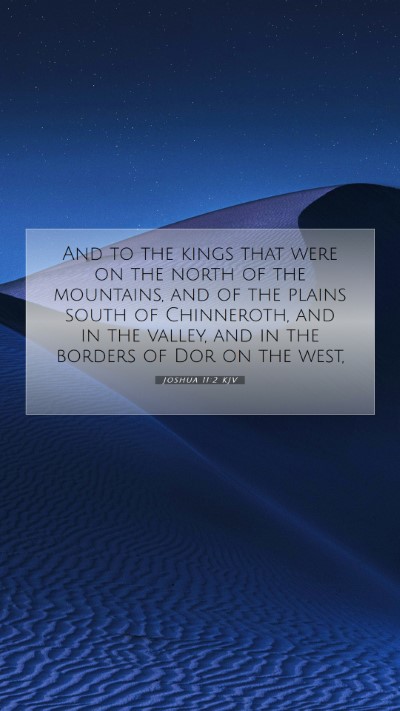Old Testament
Genesis Exodus Leviticus Numbers Deuteronomy Joshua Judges Ruth 1 Samuel 2 Samuel 1 Kings 2 Kings 1 Chronicles 2 Chronicles Ezra Nehemiah Esther Job Psalms Proverbs Ecclesiastes Song of Solomon Isaiah Jeremiah Lamentations Ezekiel Daniel Hosea Joel Amos Obadiah Jonah Micah Nahum Habakkuk Zephaniah Haggai Zechariah MalachiJoshua 11:2 Meaning
What is the meaning of Joshua 11:2?
And to the kings that were on the north of the mountains, and of the plains south of Chinneroth, and in the valley, and in the borders of Dor on the west,
Joshua 11:2 Bible Verse Meaning
Bible Verse Analysis: Joshua 11:2
The verse in Joshua 11:2 is a pivotal moment that highlights the strategic alliances formed by adversaries against Israel as they pursued the Promised Land. In this context, we explore the profound meanings and interpretations from various public domain commentaries.
Verse Context
Joshua 11:2 states:
“And to the kings who were in the north, in the mountains, and in the plain south of Chinneroth and in the lowland and in the heights of Dor on the west.”
This verse mentions alliances formed by various kings from different geographic locations, emphasizing the widespread opposition against the nation of Israel in their conquest.
Commentary Insights
Matthew Henry’s Commentary
Henry indicates that this passage illustrates the vastness of Israel's enemies as they were not only confined to a single region but were unified in opposition. He signifies that the geographical references highlight the strategic military challenges faced by Israel. Despite this, the subsequent narrative underscores God’s providence and the assurance of victory for His people.
Albert Barnes’ Notes on the Bible
Barnes expands on the implications of the alliances formed among kings specified in this verse, shedding light on their motivations. He suggests that these kings were motivated by fear and the intent to protect their territories, reflecting a common theme seen throughout the historical narrative of the conquest of Canaan. These alliances are indicative of a larger struggle for control and dominion over the land.
Adam Clarke’s Commentary
Clarke provides a detailed geographical analysis, identifying the regions mentioned in the verse. He highlights that these locations were significant not only for their military might but also for their cultural importance. Clarke emphasizes the necessity of understanding the historical and cultural context to fully appreciate the ramifications of this alliance and its contrast with God’s overarching plan for Israel.
Meaning and Application
This verse serves multiple purposes in the study of Scripture:
- Understanding Opposition: It exemplifies how God's chosen people often face collective opposition during their journey towards fulfilling His promise.
- Significance of Alliances: The tactical and political maneuverings among the kings foreshadow the ongoing conflict in the Biblical narrative, teaching us about human nature and societal power struggles.
- Historical Context: Understanding the geographic and social landscape of the time enhances our understanding of the scripture.
Cross References
- Deuteronomy 7:1: Discusses the nations that Israel will encounter upon entering Canaan.
- Joshua 10:5: Describes a similar alliance against Israel, reflecting ongoing themes of conflict.
- 1 Kings 20:1: Shows alliances formed against Israel's leaders in later history.
Conclusion
The exploration of Joshua 11:2 through various commentaries provides rich insights into the complexities of the narrative, the strategic challenges of conquest, and the unwavering assurance of God’s promise amidst opposition. Engaging with this passage through different lenses enhances our understanding of the broader Biblical narrative, providing valuable lessons applicable even today.
Bible Study Tools and Resources
For further exploration of this verse and its context, consider utilizing online Bible study resources, guides, and lesson plans specifically focused on Old Testament themes.
By incorporating commentaries and analysis in your Bible study groups or lessons, participants can gain deeper insights into not only this specific verse but the overarching messages present in the Bible.
SEO Keywords
The discussion emphasizes important keywords such as:
Bible verse meanings, Bible verse interpretations, Scripture analysis, and biblical exegesis.


